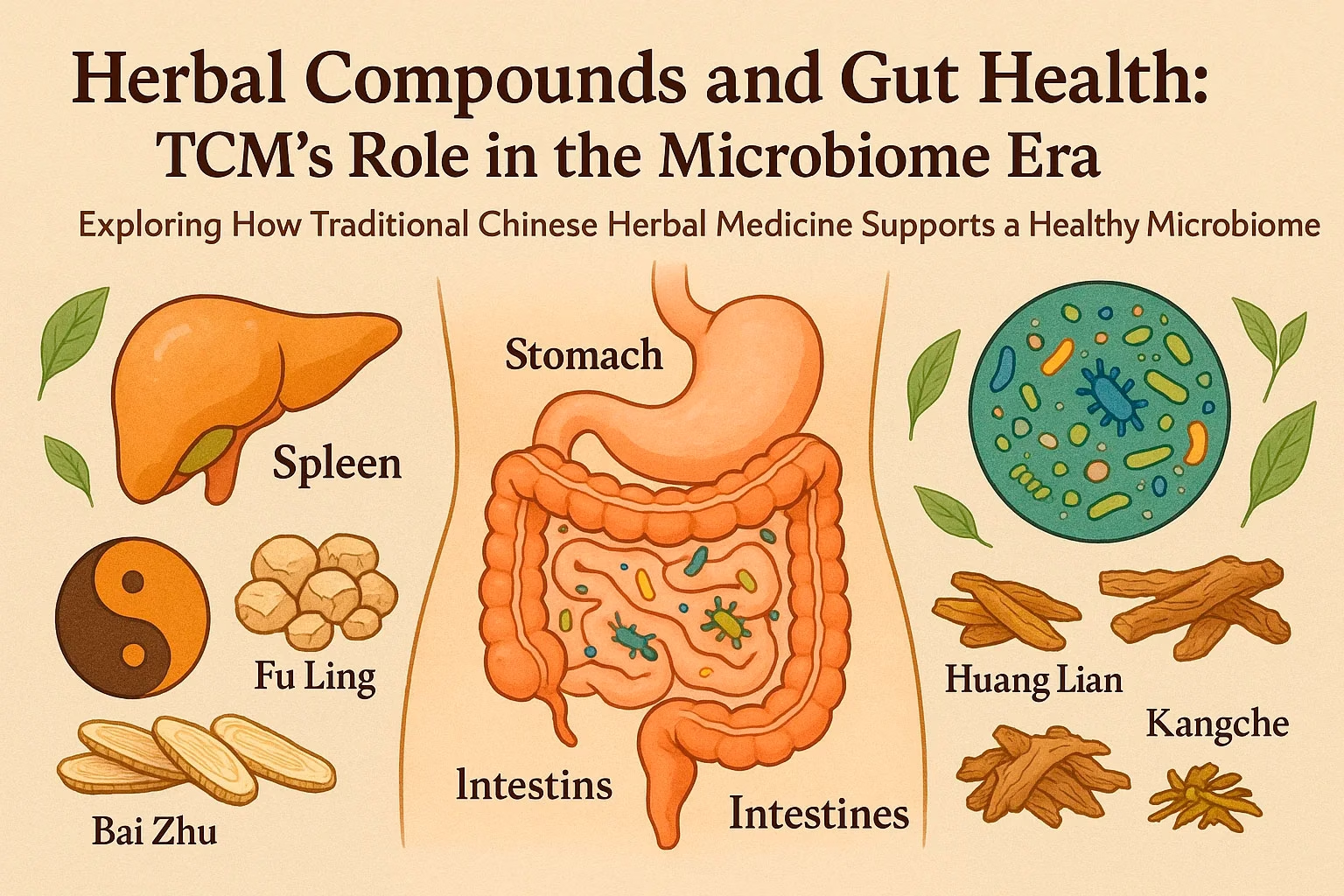Exploring How Traditional Chinese Herbal Medicine Supports a Healthy Microbiome
🔶 Introduction
In recent years, scientific research has increasingly highlighted the importance of the gut microbiome—the diverse community of microorganisms living in the human digestive tract—in regulating not only digestion, but also immune function, mood, metabolism, and inflammation. As this microbiome-based perspective on health grows, it finds remarkable synergy with Traditional Chinese Medicine (TCM), which has long emphasized the central role of the Spleen and Stomach in maintaining health.
TCM herbal formulas, especially those designed to strengthen the Spleen, dispel Dampness, and harmonize digestion, are now being studied for their effects on the gut microbiota. This article explores how classical TCM herbal strategies can positively influence microbial diversity, reduce inflammation, and restore digestive balance, effectively contributing to a modern, microbiome-conscious approach to health.
🔶 The Gut in TCM: The Role of the Spleen and Stomach
In TCM, the Spleen and Stomach are regarded as the foundation of postnatal Qi, transforming food and fluids into usable Qi, Blood, and Essence. A healthy gut environment is essential for:
- Nutrient absorption
- Fluid metabolism
- Defensive Qi production
- Emotional stability
Signs of imbalance in the Middle Jiao (middle burner) such as bloating, loose stools, fatigue, or damp accumulation correspond closely to what modern medicine calls dysbiosis—a disruption of microbial balance in the gut.
🔶 Herbal Formulas That Regulate the Gut and Microbiome
Several classical herbal formulas used for digestive regulation, immune support, and anti-inflammation have now been shown to have direct effects on the gut microbiome in experimental and clinical studies.
✅ 1. Shen Ling Bai Zhu San
- Traditional Use: Strengthens Spleen Qi, drains Dampness, stops diarrhea.
- Modern Findings: Enhances microbial diversity, increases probiotic strains like Lactobacillus and Bifidobacterium.
- Clinical Relevance: Used in IBS, chronic diarrhea, and post-antibiotic gut recovery.
✅ 2. Ban Xia Xie Xin Tang
- Traditional Use: Harmonizes the Stomach, regulates Qi, clears Heat and Cold mixed patterns in the gut.
- Modern Findings: Modulates gut barrier function, reduces intestinal permeability (“leaky gut”), and suppresses inflammatory cytokines.
- Clinical Relevance: Helpful in functional dyspepsia, acid reflux, and inflammatory bowel disease (IBD).
✅ 3. Xiang Sha Liu Jun Zi Tang
- Traditional Use: Strengthens digestion, regulates Qi, resolves bloating and fullness.
- Modern Findings: Supports gut motility, promotes beneficial bacteria, reduces methane production in cases of SIBO (Small Intestinal Bacterial Overgrowth).
🔶 Individual Herbs and Their Microbiome Benefits
TCM herbs are rich in polysaccharides, flavonoids, saponins, and alkaloids, many of which act as prebiotics or immune regulators.
| Herb | Traditional Function | Microbiome Activity |
|---|---|---|
| Bai Zhu (Atractylodes) | Tonifies Spleen, dries Damp | Enhances short-chain fatty acid (SCFA) production, supports Bifidobacteria |
| Fu Ling (Poria) | Drains Damp, strengthens Spleen | Balances gut pH, anti-fungal effects |
| Huang Lian (Coptis) | Clears Heat, detoxifies | Antibacterial, anti-inflammatory, supports Akkermansia muciniphila |
| Gan Cao (Licorice) | Harmonizes, moistens | Anti-ulcer, prebiotic, soothes intestinal mucosa |
| Sheng Jiang (Fresh Ginger) | Warms Stomach, stops nausea | Reduces pathogenic bacteria, promotes healthy bile flow |
These herbs demonstrate dual actions: while addressing TCM patterns (like Spleen deficiency or Damp-Heat), they also reshape the microbial landscape, reduce gut inflammation, and improve intestinal integrity.
🔶 TCM and the Gut-Brain Axis
TCM has long acknowledged the connection between the gut and emotions, as seen in how worry affects the Spleen, and fear influences the Kidneys. Modern research now confirms this in the form of the gut-brain axis, where gut microbes influence the production of neurotransmitters, such as serotonin, dopamine, and GABA.
Certain herbal formulas traditionally used to calm the Shen or treat emotional disorders also improve microbial composition:
- Chai Hu Shu Gan San: Soothes Liver Qi, relieves emotional stagnation, shown to modulate gut flora in stress-induced dysbiosis models.
- Gui Pi Tang: Nourishes Heart and Spleen, enhances sleep and mood, while improving gut barrier function.
🔶 Clinical Applications in the Microbiome Era
TCM herbal medicine offers a holistic, individualized approach for treating gut-related disorders:
🔸 Use in:
- IBS, IBD, leaky gut, chronic bloating, diarrhea/constipation
- Post-antibiotic microbiome recovery
- Gut-related anxiety and mood disorders
🔸 Advantages:
- Multifaceted action: tonify, harmonize, reduce inflammation, and nourish the microbiota.
- Personalized formulations tailored to the pattern of imbalance, not just symptoms.
- Safe for long-term regulation of gut health without disrupting microbial balance.
🔶 Conclusion
As modern medicine continues to explore the microbiome as a key regulator of health, TCM stands out as an ancient system already aligned with this understanding. Herbal formulas designed to support Spleen Qi, transform Dampness, and harmonize the Middle Jiao do more than just relieve symptoms—they help reshape the gut microbiota, enhance immune resilience, and bring systemic balance.
In this age of precision and integrative medicine, TCM provides time-tested, microbiome-friendly solutions rooted in a deep tradition of digestive health and internal harmony.


发表回复